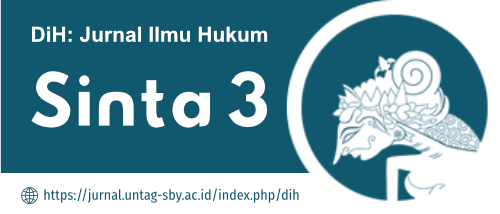UPAYA PEMERINTAH MEWUJUDKAN PEMERINTAHAN YANG BEBAS DARI KORUPSI, KOLUSI, DAN NEPOTISME
Abstract
Abstrak 18 Paragraph (2) The 1945 Constitution of The Republic of Indonesia, call that The regional authorities of the provinces, regencies and municipalities shall administer and manage their own affairs according to the principles of regional autonomy and the duty of assistance (tugas pembantuan). Organization of local governments led by the head region and assisted by a deputy regional head. In carrying out the duties and authority under Article 25 and Article 26, the regional head and deputy regional heads have an obligation in accordance with Article 27 Paragraph (1) letter (d) The Act Number 32 of 2004 on Regional Government. In this study, only the function of the regional heads in running the regional government was analyzed whether it has been in compliance or not with the norms / rule and standards based on regional autonomy of the regional heads of regional government according to democratic principles , while the deputy head of the area is not discussed.
Downloads
References
Apeldororn, L.J. van., Pengantar Ilmu Hukum, Jakarta : Penerbit Pradnya Paramita.,1978.
Atmasasmita, Romli, Korupsi, Good Gover-nance, dan Komisi Anti Korupsi di Indone-sia, Badan Pembinaan Hukum Nasional Departemen Kehakiman dan Hak Asasi Manusia Republik Indonesia. Jakarta, 2002.
Asshiddiqie, Jimly, Pengantar Ilmu Hukum Tata Negara. PT. Raja Grafindo Persada, (Jakarta:2009)
Bertens, K. Pengantar Etika Bisnis (Seri Filsa-fat Atmajaya : 21), Kanisius, Yogyakarta, 2000.
Budiman, Arief. Teori Negara, Kekuasaan dan Ideologi. Gramedia Pustaka Utama. Jakarta, 1999.
Cholid, Narbuko dan Achmadi, Abu, Metodo-logi Penelitian, Cetakan Kelima, Bina Aksara, Jakarta, 2003.
Darmadi, Sugijanto, Kedudukan Ilmu Hukum dalam ilmu dan filsafat, Mandar Maju, Bandung, 1998.
Djaja, Ermansjah, Kajian Yuridis UURI Nomor 31 Tahun 1999 juncto UURI Nomor 20 Tahun 2001 versi UURI Nomor 30 Tahun 2002 juncto UURI Nomor 46 Tahun 2009, Memberantas Korupsi Bersama KPK (Komisi Pemberantasan Korupsi), Edisi Kedua, Balikpapan; 2008.
___, Meredesain Pengadilan Tnidak Pidana Korupsi. Implikasi Putusan Mahkamah Konstitusi Nomor 012-016-019/PPU-IV/ 2006 Sehingga Diundangkan UURI Nomor 46 Tahun 2009 tentang Pengadilan Tindak Pidana Korupsi, Sinar Grafika, Jakarta, 2010.
Istiawan Witjaksono, Diskriminasi Dalam Pemberantasan Korupsi, Makalah disusun untuk memenuhi tugas mata kuliah penun-jang disertsi (MKPD), program Studi Dok-tor Ilmu Hukum Pascasarjana Untag Sura-baya, 2010.
Sarundajang.Arus Balik Kekuasaan Pusat ke Daerah, (Jakarta: Sinar Harapan. 2000). Hal 32.
M. Nasroen. Masalah-masalah di sekitar Oto-nomi Daerah,(Jakarta: Wolters, 1951), hal. 28, sebagaimana dikutip ulang oleh Agus-salim Andi Gadjong
Mohammad Hatta, Ke Arah Indonesia Mer-deka Kumpulan Karangan Jilid I,(Jakarta: Bulan Bintang, 1976
P.M. Hadjon, Pelindungan Hukum Bagi Rak-yat Indonesia, (Surabaya: Bina Ilmu, 1987), hal 76
Sri Soemantri M., Bunga Rampai Tata Nega-ra Indonesia, (Bandung: Alumni 1992),
Dani Krisnawati dkk, 2006 Bunga Rampai Hukum Pidana Khusus, Jakarta : Penerbit Pena Pundi Aksara,. Hal. 31
Ermansjah Djaja, Memberantas Korupsi Bersama KPK., Op. Cit., Hal. 20
Suyatno, Kolusi, Korupsi dan Nipotisme, Pustaka Sinar Harapan, Jakarta ; 2005, Hal.1
Ibid., Hal. 17-18 Dalam Ermansjah Djaja., Op. Cit. Hal. 23
Gurnar Myrdal, 1968, Asia Drama, Volume II, New York : Pantheon, Hal. 973
Jujun S. Suriasumantri, Filsafat Ilmu sebuah Pengantar Populer, Pustaka Sinar Harapan, (Jakarta : 2001)., Hal. 328 dan 330
Soemodiharjo, R. Dyatmiko, Mencegah dan Memberantas Korupsi – mencermati Dinamikanya Indonesia. Prestasi Pustaka Publisher. Jakarta ; 2008.
Peraturan Perundang – Undangan:
Indonesia, Undang – Undang Dasar Negara Republik Indonesia Tahun 1945.
___, Undang – Undang Nomor 31 Tahun 1999 Juncto Undang – Undang Nomor 20 Tahun 2001 tentang Pemberantasan Tindak Pidana Korupsi.
___, Undang – Undang Nomor 30 Tahun 2002 tentang Komisi Pemberantasan Korupsi.
___, Undang–Undang tentang Kekuasaan Kehakiman Nomor 4 Tahun 2004.
___, Undang–Undang tentang Pembentukan Peraturan Perundang–Undangan Nomor 10 tahun 2004.
___, Undang–Undang tentang Pengadilan Tindak Pidana Korupsi Nomor 46 Tahun 2009.
Authors who publish with DiH: Jurnal Ilmu Hukum agree to the following terms:
- Authors transfer the copyright and grant the journal right of first publication with the work simultaneously licensed under a CC BY-SA 4.0 that allows others to share the work with an acknowledgement of the work's authorship and initial publication in this journal.
- Authors are able to enter into separate, additional contractual arrangements for the non-exclusive distribution of the journal's published version of the work (e.g., post it to an institutional repository or publish it in a book), with an acknowledgement of its initial publication in this journal.
- Authors are permitted and encouraged to post their work online (e.g., in institutional repositories or on their website) prior to and during the submission process, as it can lead to productive exchanges, as well as earlier and greater citation of published work (See The Effect of Open Access)






